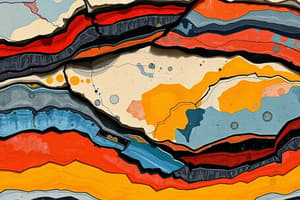Podcast
Questions and Answers
What does texture in sedimentary rocks refer to?
What does texture in sedimentary rocks refer to?
- Density and weight of the rock
- Presence of fossils in the rock
- Color and appearance of the rock
- Size, shape, and arrangement of component minerals (correct)
What controls the size of the grains transported or deposited by wind or water currents?
What controls the size of the grains transported or deposited by wind or water currents?
- Biological activity in the sediment
- Temperature of the environment
- Chemical composition of the sediment
- Strength of the wind or water currents (correct)
How does distance and time in the transportation process affect the grains?
How does distance and time in the transportation process affect the grains?
- Affect shape, roundness, and sorting of the grains (correct)
- Increase the density of the grains
- Change the chemical composition of the grains
- Cause the grains to dissolve
What may change the texture of sedimentary rocks during diagenesis?
What may change the texture of sedimentary rocks during diagenesis?
What can burrowing organisms do to sediment after it has been deposited?
What can burrowing organisms do to sediment after it has been deposited?
Flashcards are hidden until you start studying
Study Notes
Texture in Sedimentary Rocks
- Texture refers to the size, shape, and arrangement of the grains within sedimentary rocks.
- It provides insights into the processes of deposition and the environment in which the sediment formed.
Controls on Grain Size
- Grain size of sediments transported by wind or water currents is primarily controlled by the energy of the transporting medium.
- Higher energy environments (e.g., fast-flowing rivers) can carry larger grains, while lower energy environments (e.g., calm lakes) tend to deposit finer sediments.
Impact of Distance and Time on Grains
- As sediments travel further and for a longer time, they tend to become smaller and more rounded due to abrasion.
- Extended transport leads to a sorting effect, where similar-sized grains accumulate together, affecting the overall texture.
Changes in Texture during Diagenesis
- Diagenesis refers to the physical and chemical changes that occur in sediments after deposition, affecting their texture.
- Processes such as compaction, cementation, and recrystallization can alter the original grain size and arrangement.
Role of Burrowing Organisms
- Burrowing organisms enhance mixing of sediments post-deposition, which can reorganize grain structure.
- Their activity can influence porosity and permeability in sediments, leading to changes in the sediment's properties.
Studying That Suits You
Use AI to generate personalized quizzes and flashcards to suit your learning preferences.




